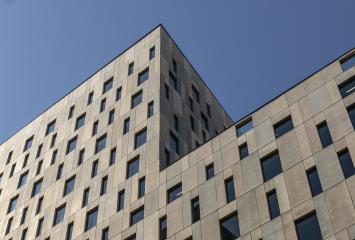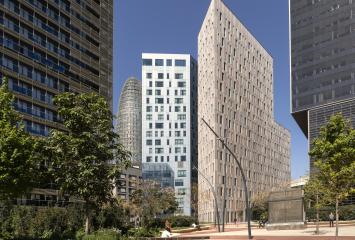The modular construction with prefabricated materials: a present and future building alternative.
Who would have guessed a few decades ago, in the midst of worldwide urban expansion, that the construction of the future would be carried out in the same way as a puzzle: with independent pieces that are strategically fitted together one by one to shape buildings and provide them with greater adaptability. But it's a reality. Although it remains a secondary building strategy, in recent years there has been a trend towards modular construction due to undeniable economic, ecological, and practical benefits that make it an interesting alternative for construction companies, building users, and the planet itself.
Economic benefits of modular building construction
Prefabricated construction typically entails lower costs than traditional construction. The reasons primarily include mass production of modular pieces and reduction of waste on the construction site. Additionally, the fact that structures are already prefabricated and only need to be assembled correctly results in significant savings in construction timelines, leading to a reduction in labor costs. Lastly, it's worth considering that modular materials of suitable quality require less maintenance over time, which is usually simpler as well.
Practical benefits of modular building construction
The maintenance of modular buildings is simpler because it only requires replacing affected prefabricated pieces with new ones in good condition. A similar situation occurs during the initial construction process: the use of prefabricated components allows for quick on-site assemblies that accelerate the total construction time and enable earlier occupancy of the building. Since the pieces are manufactured in enclosed spaces rather than outdoors, the operation is less vulnerable to weather conditions and other factors common in traditional construction.
Lastly, there's the benefit of adaptability: because prefabricated pieces can be replaced with others offering different features, modular buildings can easily adapt to evolving needs over time compared to conventional buildings. This, in turn, extends the lifespan of buildings in cities. However, modularity isn't just an external feature of buildings. At Colonial, for example, we enhance modularity within offices so that spaces can adapt to companies' requirements and provide them with optimal flexibility to compete.
Ecological benefits of modular building construction
We've reached one of the most relevant points of modular construction. After all, we're in an era where there's full awareness of the impact of construction on the environment. Citizens, workers, and companies all desire sustainable buildings. Of course, construction with prefabricated materials isn't the only path to achieve eco-friendly buildings, as demonstrated by many of Colonial's alternative sustainability decisions in recent years, but it's a solid enough approach to promote.
Specifically, among other benefits, modular construction involves a reduction in wasted materials, which brings two parallel advantages: better utilization of raw materials and a decrease in waste that could harm the environment. The ease of dismantling pieces also promotes their reuse in other buildings and the recycling of materials. Lastly, the optimal integration of pieces often promotes better insulation and therefore greater energy efficiency. Ultimately, it's a highly valuable architectural trend today and tomorrow. Let's welcome the modular world.

